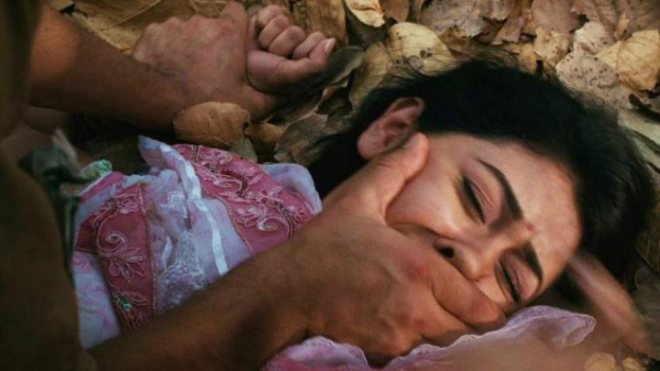 "Aria" is only 15, smiling as she greets and welcomes us into her family's tent inside the Khanke refugee camp in northwest Iraq.
"Aria" is only 15, smiling as she greets and welcomes us into her family's tent inside the Khanke refugee camp in northwest Iraq.Her parents sit nearby. Their faces, with their weathered skin and deep lines, speak of a difficult life that has just become much harder. Blankets and mattresses are stacked up on one side, except for a few that we sit on while a small fan gently whirls, creating a slight breeze in the stifling heat.
The refugee camp, outside the town of Duhok, was created just last month by the UNHCR for the massive influx of Yazidis fleeing their homes in Sinjar from the ISIS onslaught.
I ask Aria if she will tell us her story. She nods and then looks at her elderly parents and asks them to leave the tent. She doesn't want them to hear what she's about to say.
Six weeks ago the family piled into their neighbor's car in the early morning hours.
They heard ISIS was coming and they were desperately trying to escape from their home in Sinjar. They got on the road, but a convoy of vehicles with black flags flying drove past them. They thought they had got away until minutes later when at least seven ISIS vehicles appeared on the road, surrounding them.
"They forced us out of the car," said Aria. "The girls and women were separated from the men including my 19-year-old brother. But they only took the girls forcing us into a minivan."
Horrific conditions
From Sinjar, Aria, her 14-year-old sister-in-law and a handful of other girls were driven 120 kilometers to the ISIS stronghold of Mosul -- Iraq's second largest city captured by militants back in June. They were taken to a three-story house where they were locked with dozens of other teenage girls who'd been captured.
"In Mosul they tried to make us change our faith and religion," she said. "They said to us, 'Read our Quran.' A couple of the girls said, 'We never went to school - we can't read.' I couldn't understand the Quran."
For more than three weeks, Aria stayed here under horrific conditions. During this time, a sheik came and collected 20 girls including her 14-year-old sister-in-law.
"He forced himself on her. I was so scared. A lot of my friends were raped. It's hard to talk about it."
Sexual abuse is a taboo subject in this culture and to admit being a victim is unheard of.
I gently ask Aria if she was also raped. She looks straight ahead, staring at the wall and shakes her head.
It's clear the teenager has been visibly traumatized.
"I see their faces all the time," Aria said. "I have nightmares. I can't stop thinking about how they forced themselves onto the girls. I have seen and been through too much."
Shame
Tanya Kareem, UNHCR Duhok director, explains how difficult it is for girls like Aria to talk about what has happened to them.
"Even if these girls and women are released I think it's impossible for them to talk about their painful ordeal. They are traumatized. And they're from a society, a culture that does not accept what this means for the family. It brings so much shame so they just don't talk about it."
Aria and her friend were then taken to Fallujah by two ISIS militants she calls Abu Hassan and Abu Jaffar.
"They were really filthy. They had long beards; they were really tall and big. Even men would be scared of them. They forced us to marry them, threatening to hurt us if we didn't. They gave us a phone to call our families to tell them we'd converted."
Using this phone, they secretly called her friend's uncle who knew people in Fallujah who were prepared to help. When the militants left the house, the girls - dressed in niqabs -- escaped.
"My friend and I thought about killing ourselves. But we decided to ask my friend's uncle for help to escape. He had friends living in Fallujah, but they couldn't come to the house and rescue us, so we broke the door, put on veils, and walked for about an hour and met at a place where my friend's uncle's friends were waiting for us. They took us to a safe house in Fallujah."
But when she was reunited with her family in this refugee camp, she suffered once again.
"I didn't know that my brother had been killed. That made me very sad. I only had one brother. He was only married for six months. I was sad to hear this. They killed him and other men when they took me. They shot him in the head. My mother slept next to my brother's body all night."
Aria doesn't want to stay at the camp. Everyone knows what happened to her and she says they gossip and look at her whenever she goes outside. But her shame is dwarfed by her guilt after learning what happened to the other girls once ISIS discovered they'd fled.
"They raped them because we escaped. That was the punishment. They tightened security so no girls can escape anymore.
"I have to live with that."
CNN
No comments:
Post a Comment